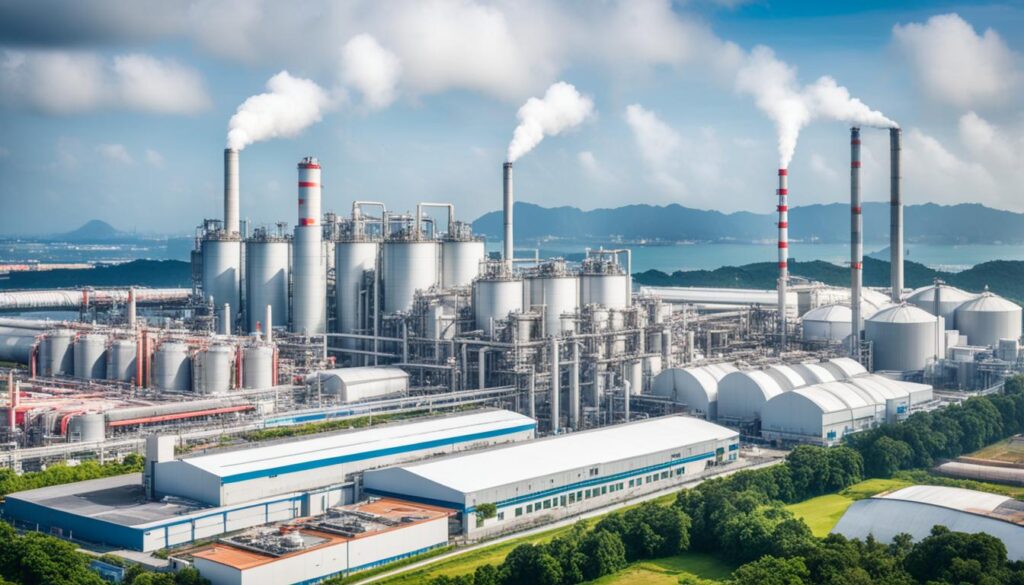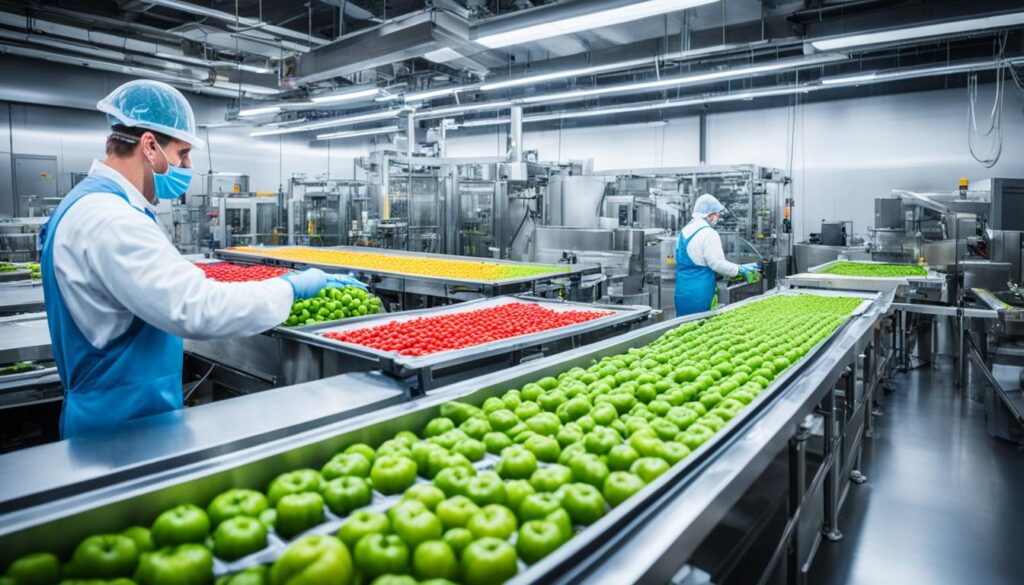Singapore is a bustling financial hub where investors seek smart opportunities. Investing in Singapore food factories is one such chance that stands out. The rise in demand for food factories and cloud kitchens has grown after COVID-19.
The support from the Singapore government makes this investment more appealing. Coupled with the limited supply and rarity of freehold properties, it offers a great investment option.
The Benefits of Investing in a Singapore Food Factory
Investing in a Singapore food factory comes with many benefits. It’s located in a key spot that opens doors to Southeast Asia’s large market. This location, combined with excellent transportation, lets you quickly send products to nearby countries.
This increases your reach and number of potential customers. Furthermore, Singapore has a lot of skilled workers. This makes it a great place for making food. The city also protects investors’ ideas and processes with strict laws.
Another plus is Singapore’s good tax policies. These policies draw in investments from abroad. This makes Singapore an attractive place for business owners wanting an advantage.
Government Support for Sustainability and Food Safety
The Singapore government is big on sustainability and food safety. They push for eco-friendly products. By working with the government’s goals, investors enter a market that cares about the planet and ethical buying.
Choosing a Singapore food factory can give your business a boost. The strategic spot, skilled labor, solid idea protection, good taxes, and government backing make it a smart choice for smart business people.

The Potential of Singapore’s Food Industry
Singapore shines in its food industry, which is known for variety and excellence. It stands out as a global food business hub due to its prime location and strong infrastructure. The government boosts food factory growth with incentives, attracting both local and international investors.
Food factories in Singapore grow because people want safe, high-quality food. Investors find a rich market here, valued for its love of great food. This market’s trust boosts Singapore’s food industry globally especially with the new upcoming food factory as Food Ascent at Tuas South.
The government’s backing is crucial for the food industry’s growth. It offers grants and incentives for innovation and sustainability. These efforts make it a great environment for business growth and draw investors looking for smart opportunities.
Investing in this sector opens doors to a market filled with possibilities. Singapore’s location and infrastructure make reaching global markets easier. Its diverse population leads to a rich food scene, attracting various tastes.
Singapore sets high standards for food safety and quality, leading globally. Its strict regulations help maintain ethical operations and high standards. This enhances trust and confidence among consumers.
Investors have a chance to join a booming sector that priorities harmony, sustainability, and top-notch culinary experiences. By leveraging Singapore’s strong reputation and supportive government policies, investors can thrive in this dynamic food industry.

Key Factors to Consider Before Investing in Singapore Food Factories
Investing in Singapore’s food factories can be very rewarding. Before you invest, it’s crucial to look at some key factors. Understanding these factors can help you make smart decisions, leading to success and good profits.
Understanding the Target Market
Know your target market for the food factory first. Do thorough market research to find out what food products are in demand. Understand what your future customers want and need. This way, you can create food products that they will love and buy.
Business Plan and Regulatory Landscape
It’s important to have a detailed business plan before you put money into a food factory in Singapore. Your plan should outline how you will make money, market your products, and comply with regulations. Knowing the laws and food safety standards in Singapore is essential. That way, you can run your food factory legally and safely.
Profitability Assessment
Figuring out if your investment will be profitable is crucial. Think about production costs, demand, and competition. It’s also important to understand how much you will spend on equipment, workers, and materials. This will help you see if your food factory can make money.
Location and Skilled Labor
The right location for your food factory is very important. Make sure it’s close to transport, suppliers, and customers. Also, check if you can find skilled workers nearby. Having a good team is key to making your food factory work well.
Partnerships and Supply Chain
Working with the right suppliers and distributors is important. Make sure you can get the materials you need and send out your products easily. A strong supply chain helps you meet customer needs and stay ahead of the competition.

Thinking about these key factors is essential when investing in a Singapore food factory. By knowing your market, making a good business plan, checking profitability, choosing the right location, finding skilled labor, and building strong partnerships, you’re set for success in the food industry.
The Profitability of Investing in Singapore Food Factories
Investing in Singapore food factories is a smart choice for investors. The city-state’s strong infrastructure, efficient supply chain, and access to global markets make it ideal. Singapore food factories use advanced technology, automation, and green practices. This lowers costs and improves operations.
With technologies like robotics and data analytics, these factories become more productive. They can do things faster and better, boosting profits. Sustainable methods like saving energy and cutting waste are key. These eco-friendly steps are good for the planet and save money over time.
Before investing, it’s wise to look closely at the costs and benefits. Consider production costs, market demand, and competition. This helps figure out if the investment could pay off. Getting advice from a financial expert can give you deeper insights. They can guide you on whether investing in Singapore’s food factories is profitable.
Learning from those who’ve succeeded in Singapore’s food market can teach us a lot. Their strategies, insights, and business models are enlightening. Knowing what they did right can help shape smarter investment choices. This could increase your chances of making money.
Investing in these factories could be profitable and beneficial for Singapore’s food industry. Taking advantage of the good market, tech improvements, and government support is key. This puts investors in a great position for long-term success in Singapore’s bustling food factory scene.
Overcoming Challenges in Managing and Scaling Food Factories in Singapore
Managing and growing food factories in Singapore is tough, but smart investors can handle it. A big challenge is finding skilled workers, especially in food tech and quality control. Investors should work with schools and training centers for a skilled workforce. This means offering training and internships to create a pool of experts in food factory management.
Having a good supply chain is key to success in this field. This involves getting materials, keeping inventory, and delivering products efficiently. Using tech like automation and data analytics can make the supply chain better and boost productivity.

Innovation is crucial for tackling challenges in this industry. Keeping up with new trends in food production and packaging helps stay ahead. Companies should look into new products, use eco-friendly methods, and keep up with what consumers want.
It’s important to keep reviewing and changing business strategies for long-term success. Watching market trends, how consumers behave, and rules of the industry helps in making smart choices. Being flexible and ready to act helps companies meet challenges and grab new opportunities.
Future Trends and Opportunities in Singapore’s Food Factory Industry
Singapore’s food factory sector is full of promise. Emerging trends and opportunities are welcoming for investors. One key trend is the rise in demand for sustainable and plant-based foods. More consumers now care about their environmental impact. They want foods that reflect their values. This opens a door for investors to create green production methods and meet this market need.
Another growing trend is e-commerce and online food delivery. The ease of buying food online and having it delivered is popular. Food factories can join hands with these platforms. This expands their reach and brings in more customers.
But, to thrive, investors must be ready to adapt to market shifts. They must track new trends closely. By being proactive, companies can seize fresh opportunities, stay ahead, and find lasting success.
Exploring Sustainable Production Methods
The call for sustainable production in food factories is loud. As people watch their environmental impact, going green can lead to success. Practices like organic farming, energy-saving tech, and waste reduction matter. Food factories that adopt sustainability can draw in eco-friendly customers and lead the way.
Adapting to the Rise of Automation
Automation is changing many sectors, including food factories. It makes operations smoother, cuts costs, and boosts efficiency. By investing in advanced automation, food factories can up their production, ensure quality, and meet market demands. Automation keeps them competitive and paves the way for growth and expansion.
Capitalizing on Technological Advancements
Technology keeps evolving in the food factory industry. Things like smart sensors and new packaging solutions are crucial. Staying updated with technology and investing in new solutions improves operations and product quality. It meets consumer needs. Plus, using tech drives innovation, letting food factories offer unique products.
Investors with an eye on trends can find many chances in Singapore’s food factory sector. They can grow by using sustainable practices, automation, and tech advances. This positions them for success in this exciting and growing field.
Understanding the Regulatory Landscape for Food Factories in Singapore
Singapore is committed to keeping food factories safe and clean. The Agri-Food & Veterinary Authority of Singapore (AVA) checks and gives licenses to food factories. This helps everyone know the food is safe.
For food factory operators, following these rules is key. It makes sure they’re doing business legally and keeping a good reputation. Meeting these tough food safety standards protects customers and builds trust in the brand.
Getting advice from food industry experts is a smart move. They know a lot and can help businesses meet all the rules. This helps factories run smoothly and keeps customers safe.
By knowing and following these rules, food businesses in Singapore can feel confident. They keep their customers healthy and make their brands stronger.
Image: Food Safety Standards
In Singapore, strict food safety standards maintain the quality of food. These rules focus on how food is handled, stored, made, and carried.
Following food safety rules is very important. It’s not just about following the law but also about keeping things clean and safe. This lowers the chance of people getting sick from food. It also makes customers trust the food they buy more.
Unleashing the Potential of Singapore Food Factories for Savvy Investors
Singapore’s food factory industry is booming, thanks to great infrastructure and government support. It’s in a perfect spot in Southeast Asia with top-notch transportation. This makes it a smart choice for investors looking for good opportunities.
For those eyeing profitability, it’s crucial to look at a few key things. Think about the market demand, how much things will cost, and who you’re up against. Also, making sure you follow the rules and keep food safe is key to doing well and building trust.
Keeping up with what’s new in the food world is critical to success. Singapore offers chances to dive into its rich food scene or tap into the growing demand for eco-friendly food. With the right moves and market knowledge, investors can really make the most of Singapore’s food factories.










